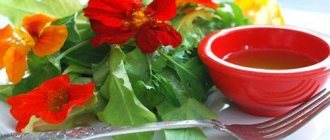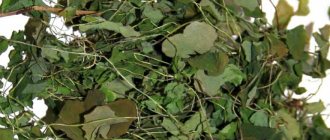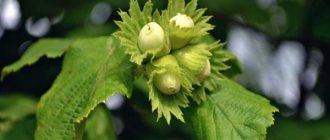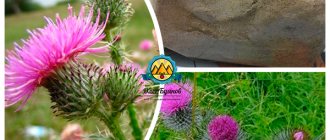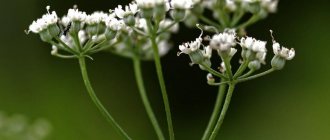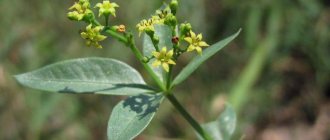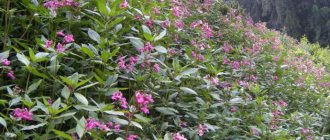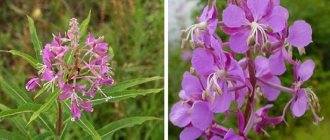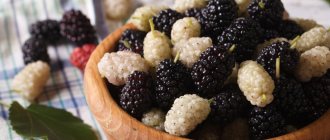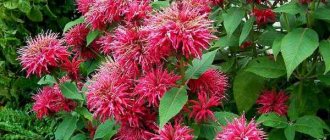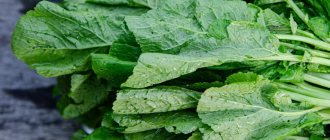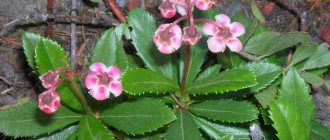Description of the plant
The lovage plant and its beneficial properties are used to cure many diseases. It is also called mountain celery, love-grass, piper, perennial celery, fence grass and others. The size of the plant is quite impressive: under good conditions it can grow to the height of a human being. It has a bare, tubular stem that branches upward. The leaves of love-grass have serrated areas on top. They usually germinate from below on short cuttings, and from above - on longer ones.
During the flowering period, inflorescences begin to appear from above. They consist of small flowers, each of which often has five petals. The flowers are light in color, usually soft shades of yellow. You can observe the flowering of this herb in the first months of summer, and approximately 1.5 months after the start of flowering, the fruits ripen.
Benefits for hair
Mountain celery root is valued for home cosmetology. Products based on it restore hair elasticity, natural shine and strengthen it. With regular use, the strands are restored and dandruff disappears.
- Crushed dried lovage root - 3 tbsp. l. cook at minimum heat for 30 minutes in 1.5 liters of water. After decanting through a fine sieve, the liquid is used to rub into the hair roots. This product does not require rinsing. Practice procedures every other day.
- Fresh washed lyubchik rhizome is finely chopped. Spread 2 tbsp. l. into a saucepan with two liters of boiling water. Cover with a towel. After three hours, the liquid fraction is squeezed through gauze. Use as a final rinse after each hair wash.
Article for you:
Medicinal properties of parsley root and its use in folk medicine
Place of distribution of the plant and rules for its collection
Mountain celery (or lovage) is quite widespread throughout the planet. Although the southern territory of Europe is considered to be the birthplace of this plant. Lovage, whose beneficial properties have been appreciated in both folk and traditional medicine, has become extremely popular and in demand. Therefore, many cultivate and breed it as a medicinal plant in their summer cottages and gardens in almost all parts of the planet where climatic conditions allow it.
For medicinal purposes, both the roots of this plant and the fruits are used. Although very rarely they take leaves. Moreover, the root system is used strictly in those plants that are 3-4 years old. Rhizomes are dug up in the fall, after the flowering process has passed. After this, they are washed and cleaned, divided into small thin strips and dried. The drying process should take place outdoors, preferably under a canopy, so that the plant is not exposed to direct sunlight.
The fruits of the love grass are also harvested in the fall, after they are fully ripe. But the leaves can be collected throughout the year from the period when the plant has bloomed until the next flowering.
Application of the root
In folk treatment, lovage rhizome is successfully used for treatment purposes. When making medicinal products at home, you must follow the instructions and recommendations of the doctor.
To increase potency
Lovegrass roots have long been considered the most effective medicinal raw material that helps men increase potency. Powder from crushed dried rhizomes can be added to a variety of dishes, excluding dairy varieties, but more often medicinal products are prepared from this raw material:
- Pour 2 tbsp into an enamel bowl. l. crushed lovage roots. Boil in a glass of water for 20 minutes at minimum temperature. After thirty minutes of infusion, squeeze out 1 tsp of the drink through two layers of gauze. take 4-5 times a day.
- Fresh washed and dried roots of love herbs - 15 grams, finely chopped. Transfer to a ladle with 250 ml of water. After boiling, reduce the heat to a minimum and simmer the product for 30 minutes. The cooled broth is filtered through a gauze filter. Drink a tablespoon before breakfast and dinner.
- A tincture recipe is used when organizing treatment to strengthen potency, for which you will need dry ground mountain celery roots - 20 grams. Combine them in a glass bottle with a glass of alcohol. The hermetically sealed vessel is kept in the cold without light for a week. It is recommended to take 30 drops before breakfast, lunch, and dinner, maintaining a half-hour interval. The course continues for 30 days.
- You can make a more gentle wine tincture. To do this, add 2 tbsp to a bottle of 0.5 liters of red wine. l. dried crushed lovage roots. The vessel is tightly closed and sent to a dark, cool place for two weeks. It is necessary to shake the contents daily. Filtered tincture of 40 ml is taken morning and evening.
Article for you:
Medicinal properties of wormwood root and its use in folk medicine
From alcoholism
Lovage has gained particular recognition for performing at-home healing measures designed to reduce harmful cravings for alcohol.
These raw materials are included in various folk recipes, based on which effective remedies are prepared. After taking them, after some time, the drinker begins to experience nausea even after a small portion of alcohol. This effect gradually forms a persistent aversion to alcohol. Fund options:
- Decoction In a saucepan, bring 250 ml of water to a boil. Add 2.5 tbsp. l crushed dried darling rhizomes. Cook on low heat for 10 minutes. Leave the dishes under a linen napkin until cooled. Express using a double gauze flap. Every morning it is necessary to give the drinker 50 ml of decoction, continuing the treatment procedures until a positive result is achieved.
- Infusion Vanga's popular recipe includes, along with lovage root, other plants - juniper fruits, horsetail, thyme and cyanosis rhizome. The components are taken in a dried, ground state in a ratio of 3:2:2:2:1. Brew 1 tsp with a glass of boiled water in an earthenware bowl. prepared collection. Leave for an hour under a towel. Filtered healing infusion, 2 tbsp. l. Consume after breakfast and dinner for 30 days.
- Tea In an enamel container, bring 200 ml of water to a boil. Add ground dried lovage roots - 2 tbsp. spoons. The container is tightly wrapped in a warm shawl and left for five hours. After straining 2 tbsp. l. drink an alcohol-healing drink every eight hours.
Chemical composition
Lyubim-grass, mountain celery, or lovage, contains a large number of active and beneficial components. Lovage, whose beneficial properties have been proven for a long time, is rich in the following elements:
- potassium salts;
- acetic, benzoic, isovaleric acids;
- vitamins;
- essential oils;
- minerals;
- carvacrol;
- gum;
- starch;
- sugar;
- coumarin;
- organic (malic, angelic) acids;
- resins and many other components.
In terms of taste characteristics, the plant is quite reminiscent of celery.
That is why they sometimes began to call him that. It is added to various dishes as a seasoning. For this purpose, leaves are usually taken both fresh and dried. Some housewives use green leaves and seeds when pickling vegetables, and candied fruits and jam are made from thinly sliced roots.
Lovage herb application
Firstly, lovage is a medicinal plant. Its second advantage is its use as a seasoning for a variety of dishes. The plant has become widespread in areas such as cosmetology (in particular, skin and hair care).
The plant has a unique property - it can be used almost without waste. And the root, and the leaves, and the petioles - there is a use for everything. But there is one condition.
During the period when the lovage is preparing for flowering (begins to produce flower stalks) or when the plant has fully bloomed, it is strictly prohibited to use it. The purpose of the intended use does not matter. It must be remembered that this period completely excludes the use of the plant either as a medicine or as a food seasoning.
You can forget about the beneficial properties at this time; lovage, accumulating dangerous substances, becomes poisonous. This is precisely the reason for the ban on use. As for the rest of the time, there is no need to be afraid; it can be collected, prepared for storage, and consumed raw.
The plant helps perfectly:
- with anemia;
- for swelling;
- if you have a headache;
- in the presence of heart disease;
- as an anthelmintic;
- if you are worried about hoarseness or bronchitis;
- if support in the form of sedatives is required;
- for gout.
The plant improves digestion
Various dishes will be much more aromatic and appetizing if you add lovage greens to them. As a seasoning, lovage makes a great addition to almost any salad. Potato, pea, bean or lentil soup will get a bright flavor with this seasoning.
Lyubets complements fried vegetables, stewed meats, and seafood dishes. And if you add the spice to zucchini (this vegetable is known to have a weak taste), then adding lovage to vegetables with a weak taste - such as zucchini - revives it, the taste of the vegetable becomes more intense.
Home cooking allows the use of all parts of lovage. Green herbs are characterized by a sharp, sweetish taste, there is a hint of slight bitterness, but at the same time a strong, pungent and persistent aroma. Can be used both dried and fresh.
Dishes to which lovage is added:
- Cabbage soup;
- Borscht;
- Soups;
- Broths;
- Fried beef, lamb;
- Fish;
- Domestic bird;
- Rice;
- Vegetables.
Cream soup with love herbs
Summer salads will take on a different shade thanks to fresh leaves, and winter salads will be complemented with a new taste with the help of powder prepared from the root of the plant. Lovage is also great with legume and seafood dishes. The taste of various gravies and sauces will improve significantly.
In many countries, lovage is used as a side dish; for this purpose, the stems and leaves of the plant are deep-fried.
On a food industry scale, a plant such as lovage is used as a flavoring agent for confectionery products. It is also used in the process of producing alcoholic beverages.
Quick Kakuska with Green Garlic and Lovage
Can complement herbs like parsley, rosemary and creeping thyme.
The spice is a strong natural flavoring agent, so it should be used sparingly. Approximate norm: fresh plant - 1 - 1.5 g per 1 liter of product, and in the form of dry powder 0.2 - 0.3 g.
Lovage: beneficial properties
This plant has long been known as a libido enhancer. Girls often used the product as an aphrodisiac: a few drops of oil on women's skin worked wonders.
Lovage herb, whose beneficial properties are due to the presence of a rich composition of microelements and active components, is often recommended in the treatment of many diseases. Medicines created on its basis, such as decoctions, oils, juice, have expectorant, sedative, diuretic properties, and also increase immunity and normalize the functioning of the gastrointestinal tract.
After numerous studies, it has been proven that the plant also has a beneficial effect on the healing of various skin injuries: wounds, minor abrasions and scratches, cuts. It is also believed that with the help of this herb you can effectively fight alcoholism.
The stronger half also often used lovage. The beneficial properties for men included renewed interest in the female half and the acquisition of masculine strength.
Our ancestors knew how to extract all possible benefits. Nowadays you can also see lovage on drug packages in pharmacies (photo). Its beneficial properties are also used in cosmetology. This plant has a very good effect on the condition of the skin and hair.
Brief characteristics and composition
Lovage is a plant that belongs to the Umbelliferae family. Its homeland is Iran. Thanks to its unpretentiousness, this crop has become widespread and is grown in many parts of the world. Lovage grass is valued for its beneficial properties, which help strengthen the body and improve health, and it also looks quite decorative.
This perennial medicinal plant is a bush that reaches a height of 2 meters in its second year. The perennial's shiny, feathery leaves and aroma are reminiscent of celery. Small yellow lovage flowers are collected in a complex umbrella, the root of the plant is quite fleshy and branched. The flowering period of the crop occurs in July, and at the end of August the fruits of the two-seeded plant are formed on it.
People call lovage differently: lovage-grass, lyubets, libistik, lyubchik, winter celery. He also has other names.
Because of their healing composition, all parts of the plant are valuable: root, stem, leaves, flowers and even seeds. People have long paid attention to lovage. Its benefits and harms are of great interest.
First of all, the beneficial properties of the herb are due to the presence of essential oil in its composition. Its percentage ranges from 0.1 to 2.7. Most of this component is in the roots and seeds of the plant. In addition to oil, the root contains angelic and malic acids, resins, starch, sugar, coumarin, carvacrol, tannins and minerals. The leaves of the perennial contain a lot of rutin, ascorbic acid and trace elements.
Use in traditional and folk medicine
Of course, natural remedies and preparations based on this herb are very popular because they have much fewer side effects. But still, as with any other medication, before starting treatment you should consult with a doctor who specializes in the disease that is bothering you.
Various decoctions, tinctures, oils based on lovage, as well as juice from this plant are very popular. There are many variations of the decoction that helps in the fight against alcoholism.
In cosmetology, mountain celery is used as a basis for preparations that help fight baldness, freckles, itching, problem skin and various inflammations. Another quite popular procedure is taking a bath with a decoction or tincture of lovage added to the water.
According to the results of some studies that studied the effects of love grass under the influence of radiation, this plant provides fairly good protection.
Raw materials from lovage
The root of the lovage is radix Levistici, the herb is herba Levistici, the fruit is fructus Levistici. Lovage roots are collected in the fall, in the second to fourth year after sowing, cleared of soil, washed in cold water, dried in the shade, in a well-ventilated area or at a temperature of 35 (40) ° C. The taste is spicy. Dried roots are stored in boxes lined with paper inside. Leaves and grass are collected during the flowering period, in June-August, as needed; They smell like celery, only stronger. Lovage fruits are at full maturity.
Decoctions for alcoholism based on love-herbs
Lovage, whose beneficial properties and contraindications have long been studied, is not a completely safe remedy for solving this issue. It should be noted that in no case should you deviate from the basic proportions indicated in the recipes to achieve more effective results.
In order to create a decoction for the treatment of alcoholism, you will need a quarter liter of vodka, lovage root and a couple of laurel leaves. Pour vodka into a container that can be screwed tightly, add laurel roots and leaves and leave for 14 days. After this, drinking a glass of infusion should forever instill in the alcoholic an aversion to alcohol.
Action and use of lovage
Lovage has an expectorant, diuretic, socogonal, tonic, sedative, choleretic, carminative, laxative, tonic, blood purifying, antiseptic, antibacterial, and weak analgesic effect. Lovage is used for asthenic conditions, to improve appetite, as a “blood purifier” for skin rashes, works well for kidney diseases, edema of various origins, circulatory failure stages I and II, is recommended for gastrointestinal colic, flatulence, constipation (has a beneficial effect on intestinal motility), biliary dyskinesia, chronic cholecystitis, anemia, salt diathesis, gout, rheumatism, with irregular, scanty menstruation, algomenorrhea. Lovage roots are indicated in the diet for diseases of the liver, gall bladder, kidneys, obesity, and rheumatism. Taking the leaves is accompanied by a decrease in the number of heart contractions, decreased shortness of breath, and improved well-being. Externally use a decoction of herbs or lovage root for baths, lotions for purulent wounds, ulcers, hair loss; the leaves are used for poultices.
Medicinal products based on love-herbs
One of the popular plants used in cosmetology is lovage. The beneficial properties for women include not only an aphrodisiac, but also care for hair, body and facial skin.
One of the universal tinctures is the following. The root of the plant is used as the main element. Take a glass of boiling water for half a tablespoon of root. Place the plant in a small saucepan, pour out the water and cook over low heat for another half hour from the moment the infusion boils. This infusion can be taken internally, 1-2 tablespoons up to 3 times a day to normalize the functioning of the gastrointestinal tract, for kidney diseases, and inflammation in the bile ducts.
For skin problems, to eliminate the effects of allergic reactions, dermatitis and eczema, the infusion is used as a tonic for wiping or as a lotion. It is also effective to use it while taking a bath.
What are the benefits of lovage for humans?
Lovage has a wide range of uses in alternative medicine. It is especially useful to use the herb as a spice in winter. The rich vitamin content ensures a strong immune system, which protects against a number of diseases. Infusions and decoctions are prepared both from the rhizome and from the above-ground part of the plant.
The healing agent is famous for the following properties:
- getting rid of parasites;
- analgesic effect;
- strengthening the immune system;
- diuretic effect;
- normalization of the cardiovascular system;
- getting rid of alcohol addiction;
- relief of inflammatory processes;
- elimination of insomnia;
- fight against neuroses;
- treatment of skin diseases.
Very often, lovage is used for worms. The necessary effect is achieved thanks to the burning taste and the ability to increase body temperature. At the same time, the grass has a disinfecting effect, preventing the proliferation of parasite larvae.
Lovage is also known as a powerful pain reliever. At the same time, the plant has a beneficial effect on the functioning of the digestive tract. It stimulates the production of gastric juice and cleanses the intestines. Lovage is recommended to be taken as a powerful laxative.
Beneficial properties of lovage herb for men
Lovage can also be used to treat male diseases. The herb is effective in relation to reproductive function. The substances present in its composition increase sexual desire and improve blood flow to the pelvic organs. This normalizes erection and prevents the development of inflammatory processes in the prostate.
For men, lovage is indicated for alcoholism. It eases withdrawal symptoms by removing toxins from the body. Taking a herbal decoction causes an aversion to alcoholic beverages. This is why lovage therapy is often called natural coding.
Beneficial properties of lovage herb for women
Being a powerful aphrodisiac, lovage is widely used among women. In ancient times, the herbal essential oil was used instead of perfume, as it has an attractive aroma. Today, it is often used to eliminate menstrual pain and stimulate reproductive function.
We recommend reading: Medicinal properties of poplar buds, leaves, bark and contraindications
As part of homemade hair masks, lovage helps get rid of alopecia. In addition, the herb strengthens the hair follicles and gives the hair a natural shine. Experts recommend adding a few drops of lovage essential oil to your balm conditioner. In cosmetology, the plant is used to combat aging and acne. To achieve the desired effect, the procedure is carried out at least 3 times a week. The herbal decoction can be used as a cleansing tonic. It makes the skin smoother and effectively eliminates age spots. The antiseptic effect of the plant helps get rid of acne and prevent its occurrence in the future.
In some cases, the plant is used not only dried, but also fresh.
Contraindications
Lovage, whose beneficial properties and contraindications have been known for a long time, cannot be used by everyone. First of all, any dosage forms based on this plant are contraindicated for women during pregnancy and lactation. It is also not recommended for use by children under 16 years of age. If the plant is used as a remedy for alcoholism, you need to carefully monitor the results. If the patient constantly feels nauseous, it is better to stop treatment, consult a doctor and reconsider the course.
If patients suffer from kidney disease, lyub-grass is also contraindicated for them. For women with heavy menstruation or bleeding in the uterus, this plant is strictly prohibited.
Remember that before starting treatment with a folk remedy, you should consult a doctor. Then you will not harm the body.
Where is it used?
Thanks to its many beneficial properties, lovage has become widespread not only in medicine, but also in cooking. In ancient times, it was used to perform magical rituals in order to attract the opposite sex. No less effectiveness is observed in the treatment of alcoholism. This versatility is due to the complex composition of the plant.
Attention! Lovage extract is often found in medications approved by traditional medicine.
The use of lovage in folk medicine
Lovage is one of the most popular herbs used in herbal medicine. It can be used both as an independent product and as part of multi-component collections. Herbal decoctions and infusions are prepared based on dried raw materials. They are added to the bath, used for inhalation and taken orally. In alternative medicine, the plant is suitable for the treatment of the following diseases:
- migraine;
- impotence;
- chronic form of bronchitis;
- nervous disorders;
- helminthic infestations;
- alcoholism;
- diseases of the reproductive system;
- flatulence;
- anemia;
- diseases of the digestive system;
- gout;
- swelling.
Sometimes lovage roots are used to make herbal tea.
Lovage helps to get rid of drunkenness already in the first week of use. Drinking alcohol during therapy leads to vomiting and dizziness. On this basis, the craving for alcohol gradually decreases. To treat alcoholism, you can use any form of medication, except alcohol tincture.
We recommend reading: What are the benefits of castor oil, instructions for use at home
Elimination of edema with the help of lovage occurs due to its diuretic effect. The plant removes excess fluid from the body, which is especially important in the process of losing weight. At the same time, the herb effectively copes with joint pain and cleanses the body of toxins.
Lovage has the ability to stimulate peristalsis. This helps with serious pathologies of the digestive system. In some cases, this effect can result in stool upset. Therefore, the plant is often used to treat constipation.
Use of lovage herb in cooking
Due to its unusual spicy taste, the herb is often used as a seasoning. It is as popular as dill and basil. The spice perfectly complements the taste of meat and vegetable dishes. It goes well with rice, eggs and cheese. A distinctive feature of lovage is its pungent taste and lemon aroma.
Lover during pregnancy
While pregnant, the use of lovage is strictly prohibited. The exception is cases in which the potential harm from the disease outweighs the side effects. You should check with your doctor individually about the possibility of using a medicinal product. During lactation, it is advisable to avoid using herbal remedies. Despite its natural origin, it can lead to an allergic reaction in the baby.
